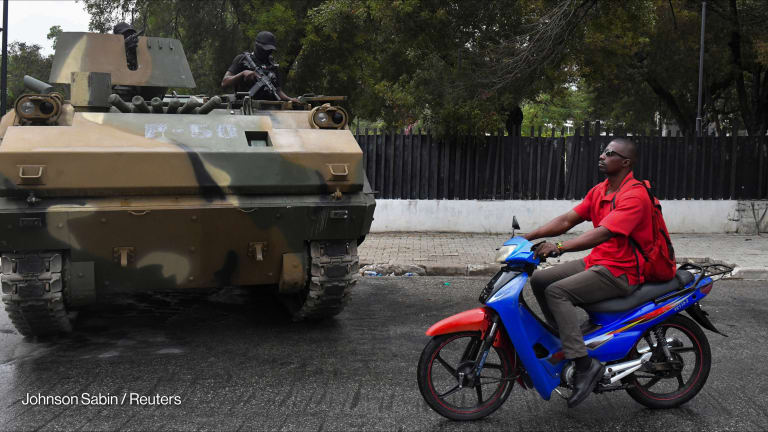
WASHINGTON — Secretary of State Mike Pompeo’s visit to Capitol Hill on Wednesday was marked by a debate on his announcement of the expansion of the Mexico City policy made earlier this week. The hearings, which were meant to be about the administration’s request to cut the budgets for the Department of State and the U.S. Agency for International Development, instead focused more on the United States’ role on foreign assistance.
While the proposed budget cuts were rejected by lawmakers, the outlook on the implications of the Mexico City policy, or “global gag rule,” were less unanimous.
“This budget request was dead the moment it arrived on Capitol Hill.”
— Rep. Eliot Engel, Democrat from New YorkIn the last Congress, there was a lot of bipartisanship on foreign affairs, but it seems things may be more contentious this time around — from abortion debates to more pressure on oversight — despite assurances in the House Foreign Affairs Committee hearing that there were continued efforts to work together.
Global gag rule
The newly expanded global gag rule will now not allow foreign NGOs that receive U.S. global health assistance to provide money to other organizations that perform or promote abortion, including offering legal advice or counselling related to abortion. The Organization of American States, for example, will lose funding from the State Department.
The announcement was met with considerable opposition from Democrats. “Your additional expansion of the global gag rule compromises our ability to support comprehensive, life-saving care to those most in need. International NGOs should not be forced to choose between accepting lifesaving assistance from the United States or providing legal, comprehensive care with their own funds,” said appropriations subcommittee chairwoman, Representative Nita Lowey, a Democrat from New York.
Other Democrats made the argument that the move will undermine the potential success of other stated administration priorities, including the Women’s Global Development and Prosperity initiative.
Rep. Lois Frankel, a Democrat from Florida, said the administration has an “ultra-obsession with abortion” and asked Pompeo what kind of analysis the administration is doing to see or understand the effect of cutting off funds through the global gag rule, and its impact on women’s health.
Pompeo said that they disagree about abortion but that the new Mexico City policy will not mean a single dollar reduction for women’s health care.
Ranking member Rep. Hal Rogers, a Republican from Kentucky, and other Republicans thanked Pompeo for expanding the policy.
Request for budget cuts
The administration’s request for budget cuts was rejected by lawmakers.
“This budget request was dead the moment it arrived on Capitol Hill,” said Rep. Eliot Engel, a Democrat from New York and the chair of the House Foreign Affairs Committee. “I don’t know whether the administration really believes we can mount an effective foreign policy — one that advances American interests, values, and security — on a shoestring budget or if the people calling the shots just don’t care. But Congress won’t stand by and see American leadership on the global stage undermined. And that’s not just our opinion. That’s the power of the purse. That’s what we’re supposed to do.”
US budget slashes global development funding, stresses burden sharing
For the third consecutive year, the Trump administration's budget proposes cuts to global development funding — as well as policy changes related to U.S. aid reorganization. Devex scoured the 150-page document so you don't have to.
Ranking member Rep. Mike McCaul, a Republican from Texas, added that the budget proposal “contains some much-needed reforms. However, I do agree with the chairman that certain cuts can have unintended consequences that cost us more in the long term,” he said.
“This is especially true of cuts to critical humanitarian and developmental assistance programs that promote democracy, support economic growth, and provide lifesaving resources to bolster stability in areas at risk of terrorism and extremist ideologies.”
Pompeo’s common refrain in response to questions about the budget was that the department had to make difficult decisions but that he is “confident we can deliver on our objectives.”
Humanitarian aid
One policy change that was introduced in the proposed budget — bringing the State Department’s humanitarian assistance work into the new USAID bureau where the agency’s Office of U.S. Foreign Disaster Assistance and the Office of Food for Peace will be combined — was brought up at the hearing.
Rep. Grace Meng, a Democrat from New York, said she thought cutting refugee funding by 24 percent was “irresponsible and dangerous” to U.S. national security and expressed concern that “decoupling refugee programming from diplomatic efforts” would reduce the effectiveness of U.S. diplomacy on refugee issues.
Pompeo responded that there was a “lively debate” underway about how that should proceed, but said that he believed the State Department should be involved and well connected, to execute the policies properly.
The hearing also served as a platform for a discussion about Syria, the geopolitics at play, the U.S. approach, and about the budget request.
Responding to Rogers’ question on why the budget didn’t request funds for Syria, when maintaining hard-won gains will take considerable work, Pompeo said that the administration provides some humanitarian aid but that it cannot work in two-thirds of the country. He added that reconstruction can’t happen with President Bashar al-Assad in power and until there is a pathway to a political resolution.
Another humanitarian aid issue Pompeo addressed was about Myanmar and whether the State Department would officially decide that the Rohingya were victims of crimes against humanity, a legal designation that has more recourse than the ethnic cleansing designation the State Department has used so far. Pompeo said he’s still looking at the issue but wasn’t ready Wednesday to make that designation.
Global health
Cuts to the budget for the President’s Emergency Plan for AIDS Relief and the proposal to reduce the U.S. contribution to the Global Fund to Fight AIDS, Tuberculosis and Malaria were brought up by. Rep. Barbara Lee, a Democrat from California, who expressed concerns about the cuts and said that they could “result in backsliding of gains.”
Pompeo said that the administration is committed to the mission to end AIDS and the U.S. has been the most generous nation and it will continue to lead. PEPFAR is a program that shows “demonstrable effectiveness” but after this length of time it can deliver better on its mission and that the state department had to make decisions about how to “apply resources against a problem set.”
Lee pushed him, saying that every report shows that if the U.S. pulls back its support, efforts to end AIDS will not succeed and that she hasn’t seen a plan that shows new infections won’t emerge with the reduced funding levels.
Pompeo’s response was “we’re going to succeed.”
Strategy for other countries
The hearings were wide-ranging, from assistance in Africa to Middle East politics to countering China in a variety of regions, and the conflict in Venezuela.
Lee asked about the administration’s Africa strategy, especially in light of proposed cuts to bilateral assistance on the continent. Pompeo said that the State Department is looking at every country individually but that countries need to demonstrate they are stepping up and using resources to address issues in their countries.
On Venezuela, Rogers asked about whether the budget request was, in fact, sufficient to meet humanitarian needs and all the other issues that are spilling over as displacement intensifies. Pompeo said that today the resources are sufficient but that the agency may come back and say it needs additional assistance.
Search for articles
Most Read
- 1
- 2
- 3
- 4
- 5








